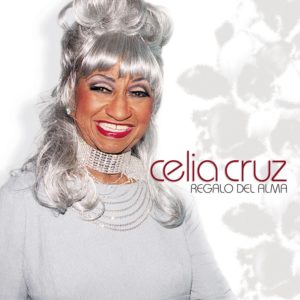 CELIA CRUZ, IMPETUOSA, AVASALLANTE, SEDUCTORA. NUNCA OLVIDADA.
CELIA CRUZ, IMPETUOSA, AVASALLANTE, SEDUCTORA. NUNCA OLVIDADA.
EN UNA DE LAS MUCHAS FAMOSAS FRASES que Winston Churchill nos dejara para la posterioridad decia: “Existen tres tipos de personas: aquellas que se preocupan hasta la muerte, las que trabajan hasta morir y las que se aburren hasta la muerte”. De seguro fue que el mentor de esta frase nunca conoció a Celia Cruz, quien le hubiera demostrado que es posible disfrutar de la vida hasta el acabose. Además, en ese hipotético limbo de los encuentros nunca consumados, La Guarachera de Cuba seguramente le habría demostrado que ella también ostenta una expresión tan universal como la del estadista británico, aunque literalmente más dulce: “¡Azúcar!”.
Hoy, al casi cumplir dos décadas de su fallecimiento (Julio 16, 2003), aún se añora infinitamente a la cantante habanera, lo que es una sensación angustiosa, pues su legado no hubiera sido el heraldo del que goza actualmente la música popular ya no sólo del Caribe, sino de la América entera, sin esa personalidad tan propia del tempero tropical: avasallante, impetuosa, cándida, dramática y seductora. Un huracán devastador de corazones insulares, los mismos que luego de experimentar su vendaval sonoro descubrieron la alegría.
A pesar de la dicha que irradiaba, Celia Cruz era una superviviente, pues anteriormente tuvo una cita con una de las formas más agónicas de morir: el destierro. Como si se tratara de una paradoja del destino, el 15 de julio de 1960 la artista, cuya pasión por la música fue más poderosa que la decisión de su padre de que fuera maestra de escuela, salió de Cuba junto a La Sonora Matancera, la orquesta que la disparó hacia la popularidad, con destino a México, sin imaginarse que no regresaría nunca más a su terruño, ni para actuar ni mucho menos para enterrar a sus padres. Y es que meses antes, Fidel Castro puso en marcha la Revolución cubana, de la que la cantante fue adversaria hasta el fin de sus días. Lo más cerca que pudo volver a estar de su gente fue en la base naval de la bahía de Guantánamo, en 1990, donde al bajar del avión se arrodilló, besó tres veces el suelo, se acercó al alambrado que divide a la instalación del resto de la isla, cogió un puñado de tierra, la metió en una pequeña bolsa, y, a manera de último deseo, pidió que lo vertieran en su ataúd.
Así que la máxima embajadora musical de la mayor de las Antillas, quien vivió básicamente en el oscurantismo cultural de su país, en el que se aceptó recién en los ochenta su condición de exiliada, pudo escucharse nuevamente en las radios cubanas hace unos pocos años, cuando el gobierno de Raúl Castro levantó el veto que pesaba sobre ella, al igual que en otros 49 exponentes.
Durante todos esos años, sus compatriotas nunca se enteraron de sus cientos de giras alrededor del mundo, de que fue la primera hispana y negra en presentarse en el Carnegie Hall, de su intervención en Los Reyes del Mambo y otras tantas películas, de sus cinco Grammy, y del Récord Guiness que estableció en 1987 en el Carnaval de Santa Cruz de Tenerife, al convocar 250.000 personas, en el mayor concierto en una plaza abierta que se haya dado en la historia. O de sus colaboraciones con artistas que, pese a pertenecer a manifestaciones sonoras tan distintas, como Ricky Martin o Los Fabulosos Cadillacs, no podían disimular su admiración hacia su trayectoria.
Celia Cruz es una artista inmortal, usa sencilla y bella persona que nunca olvidaremos.
 CELIA CRUZ, IMPETUOUS, IRRESISTIBLE, EXCITING. NEVER FORGOTTEN.
CELIA CRUZ, IMPETUOUS, IRRESISTIBLE, EXCITING. NEVER FORGOTTEN.
IN ONE OF THE MANY FAMOUS PHRASES that Winston Churchill left us for later, he said that “There are three types of people: those who worry until death, those who work until death and those who are bored until death.” It was surely that the mentor of this phrase never met Celia Cruz, who would have shown him that it is possible to enjoy life until its end. Furthermore, in that hypothetical limbo of never-consummated encounters, La Guarachera de Cuba would surely have shown him that she also has an expression as universal as that of the British statesman, although literally sweeter: “Sugar!”
Today, almost two decades after her death (July 16, 2003), the Havana singer is still infinitely longed for, which is a distressing sensation, since her legacy would not have been the herald enjoyed by popular music today. not only from the Caribbean but from the whole of America, without that personality so typical of the tropical tempera: overwhelming, impetuous, candid, dramatic and seductive. A devastating hurricane of island hearts, the same ones who, after experiencing its sonorous gale, discovered joy.
Despite the happiness that radiated, Celia Cruz was a survivor, as she previously had a date with one of the most agonizing ways to die: exile. As if it were a paradox of fate, on July 15, 1960, the artist, whose passion for music was more powerful than her father’s decision to become a school teacher, left Cuba with La Sonora Matancera, the orchestra that shot her towards popularity, bound for Mexico, without imagining that she would never return to her homeland, nor to act, much less to bury her parents. And it is that months before, Fidel Castro launched the Cuban Revolution, of which the singer was an adversary until the end of her days. The closest he could ever be to his people was at the Guantanamo Bay naval base, in 1990, when he got down from the plane he knelt down, kissed the ground three times, approached the wiring that divides the installation from the rest From the island, he picked up a handful of dirt, put it in a small bag, and, as a last wish, asked to be dumped in his coffin.
So the highest musical ambassador of the largest of the Antilles, who lived basically in the cultural obscurantism of her country, in which her exile status was accepted only in the eighties, could be heard again on Cuban radios a few years ago, when the Raúl Castro government lifted the veto that weighed on it, as in 49 other exponents.
During all those years, her compatriots never found out about her hundreds of tours around the world, that she was the first Hispanic and black woman to appear at Carnegie Hall, of her intervention in Los Reyes del Mambo and many other films, of her five Grammy, and of the Guinness Record that it established in 1987 at the Carnival of Santa Cruz de Tenerife, when it summoned 250,000 people, in the largest concert in an open square that has occurred in history. Or her collaborations with artists who, despite belonging to such different sound manifestations, such as Ricky Martin or Los Fabulosos Cadillacs, could not hide their admiration for her career.
Celia Cruz is for all Cuba an immortal artist, a simple and beautiful person that we will never forget.
Agencies/ ELPAIS/ VeraRojas/ Extractos/ Excerpts/ YouTube/ Internet Photos/ Arnoldo Varona/ www.thecubanhistory.com
THE CUBAN HISTORY, HOLLYWOOD.









